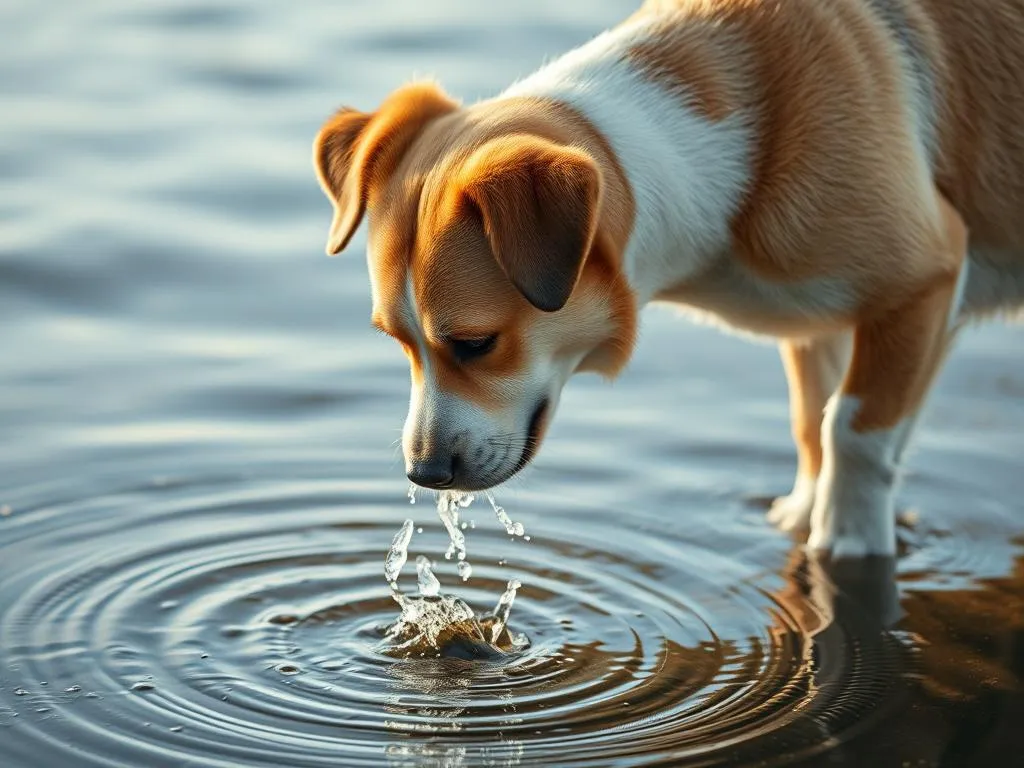
Introduction
Did you know that a dog’s sense of smell is estimated to be between 10,000 to 100,000 times more acute than that of humans? This incredible ability allows dogs to detect scents that are imperceptible to us, leading many to wonder: can a dog smell water? Understanding a dog’s capability to perceive water through their extraordinary olfactory system not only fascinates dog owners but also highlights the special bond we share with these remarkable animals.
When we talk about a dog “smelling” water, we’re referring to the ability of dogs to detect the unique scent associated with water molecules. This phenomenon is crucial for various reasons, including hydration needs, training, and even search and rescue operations. In this article, we will explore whether dogs can indeed smell water, the science behind it, and the practical implications of this ability in everyday life.
Understanding a Dog’s Sense of Smell
Anatomy of a Dog’s Nose
To appreciate how dogs can potentially detect water, it’s essential to understand the anatomy of their nose. A dog’s olfactory system consists of approximately 300 million scent receptors, compared to only about 6 million in humans. Additionally, the part of a dog’s brain that processes smells is significantly larger than that of humans, indicating their heightened capability for scent discrimination.
The unique structure of a dog’s nose contributes to their ability to analyze scents. The turbinates—small bony structures within the nasal cavity—help filter and trap scent particles, allowing dogs to detect even the faintest odors. This intricate system makes dogs exceptional at identifying various scents, including those associated with water.
How Dogs Use Their Sense of Smell
Dogs employ their sense of smell in various ways, showcasing their natural instincts and training. Scent discrimination enables them to differentiate between countless smells, an ability they utilize in activities such as hunting, tracking, and search and rescue missions. For instance, bloodhounds are renowned for their tracking skills, often leading search teams to missing persons through scent trails.
In everyday life, many dogs instinctively seek out water sources, whether in the wild or at home. This innate behavior demonstrates their connection to their environment and their understanding of essential resources.
Can Dogs Really Smell Water?
Scientific Insights
Recent studies have begun to explore the intriguing question: can a dog smell water? While direct research on dogs’ ability to smell water is limited, scientists suggest that water molecules can carry scent particles. This means that when a dog encounters a water source, it may pick up various odors associated with that water, including organic materials, minerals, and even scents from animals that have been near the water.
Moreover, researchers have investigated how dogs react to different types of water. For example, dogs may exhibit varying behaviors when encountering fresh versus stagnant water. This difference could indicate that they can detect varying scents associated with each type of water, hinting at their ability to differentiate between sources.
Anecdotal Evidence
While scientific data is still developing, many dog owners and trainers provide anecdotal evidence that supports the idea that dogs can smell water. Numerous stories recount dogs leading their owners to hidden water sources, such as streams or ponds, during hikes or outdoor adventures. Trainers often share experiences of dogs successfully locating water in wilderness survival situations, further illustrating their innate ability to sense water.
Factors Affecting a Dog’s Ability to Smell Water
Several factors can influence a dog’s ability to smell water, including environmental conditions and breed characteristics. Humidity and temperature can significantly affect how well scents travel in the air. For instance, high humidity can enhance a dog’s ability to detect scents, making it easier for them to locate water sources.
Additionally, different dog breeds have varying levels of olfactory capabilities. Breeds like Bloodhounds and German Shepherds are known for their exceptional scent-tracking skills, while others may not possess the same level of intensity. Understanding these differences can help dog owners gauge their pets’ abilities and instincts.
The Role of Water in a Dog’s Life
Importance of Water for Dogs
Water is a fundamental component of a dog’s overall health and well-being. Proper hydration is crucial for digestion, circulation, and temperature regulation. Dogs can lose a significant amount of water through panting, urination, and physical activity, making it essential for them to have access to fresh water at all times.
Instinctively, dogs search for water sources. Wild ancestors of domestic dogs relied on natural water bodies for hydration, and this instinct remains in our pets today. Understanding this behavior can help owners ensure their dogs’ needs are met, especially during outdoor excursions.
Training Dogs to Locate Water
Training dogs to locate water can be a rewarding experience for both the dog and the owner. Various techniques can be employed to enhance their natural abilities. For instance, scent training can help dogs learn to identify and differentiate between various smells associated with water sources.
Positive reinforcement techniques, such as rewarding a dog for showing interest in water, can encourage them to explore and locate water more effectively. This training can be beneficial for working dogs, such as those in search and rescue or conservation roles, as well as for pet dogs who enjoy outdoor activities.
Myth-Busting: Common Misconceptions About Dogs and Water
Myths Surrounding Dogs and Water Detection
Despite the plethora of information available about dogs’ sense of smell, several myths persist regarding their ability to detect water. One common misconception is that dogs can only smell water when it is in a large body, like a lake or river. In reality, dogs can detect even small amounts of water, provided that it’s associated with recognizable scents.
Another myth suggests that all dogs can equally smell water. As previously discussed, the olfactory capabilities vary significantly among breeds, and not every dog will have the same proficiency in locating water sources.
The Truth Behind Dogs and Water
The truth is that while dogs may not specifically “smell” water in the way we understand it, they can detect the scents associated with water and the environment around it. This ability can lead them to water sources, showcasing their natural instincts and remarkable olfactory skills. By debunking these myths, we can better appreciate the capabilities of our canine companions.
Practical Applications of Dogs’ Water-Sensing Abilities
Search and Rescue Operations
Dogs have long been invaluable assets in search and rescue operations, particularly in water-related incidents. Their ability to detect scents in challenging conditions can lead rescuers to individuals who may be in danger. For instance, dogs have been employed in drowning incidents to locate victims submerged in water, showcasing their impressive capabilities in crisis situations.
Case studies highlight successful operations where dogs were able to lead search teams to missing persons near bodies of water, further emphasizing the practical applications of their enhanced sense of smell.
Conservation Efforts
In addition to search and rescue, dogs are increasingly being used in conservation efforts. Various programs utilize dogs to locate water sources essential for wildlife, especially in arid regions where water is scarce. These trained dogs can identify hidden springs or streams, aiding conservationists in their efforts to protect ecosystems and wildlife habitats.
By leveraging dogs’ natural abilities, organizations can enhance their environmental monitoring efforts, demonstrating the versatile role dogs play in our lives and the planet’s health.
Conclusion
In summary, while the question of can a dog smell water may not have a straightforward answer, it is evident that dogs possess an extraordinary ability to detect scents associated with water sources. Their remarkable olfactory system, combined with their instincts and training, allows them to locate water in various environments. Understanding these capabilities not only enriches our knowledge of canine behavior but also strengthens the bond we share with our four-legged friends.
As dog owners and enthusiasts, we should cherish and nurture our dogs’ natural instincts, recognizing the essential role they play in our lives and the environment. Observing our dogs’ behaviors related to water can provide fascinating insights and deepen our appreciation for their incredible abilities.









